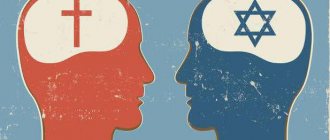Baptists, alas, are often judged by hearsay. Often the reaction to the mention of them is sharply negative: “sectarians!”, “they sacrifice children!”, “banned in Russia!” But Baptists and Orthodox Christians do not have such significant differences.
By scolding something about which we do not have a clear idea, we Orthodox Christians do not present ourselves in the best light. Let's fill the gap in knowledge: let's talk about who Baptists are, whether they are a sect or not, and how to relate to them from the point of view of Orthodoxy.
Are Baptists a sect or not? No!
For many Orthodox Christians, Baptistism remains something closed and incomprehensible. Staying aloof from other religious traditions, we understand little about the differences between Baptists and Pentecostals or Calvinists.
And there is a terrible tendency to call everyone who is not Orthodox (at best, not Catholic) a sect. This is mistake.
Alexander Buganov in his “Handbook of Heresies, Sects and Schisms” writes:
Alexander Buganov
Doctor of Historical Sciences
“A sect is considered to be an organized society of people whose views agree with each other and are opposed to the dominant Church. This word is usually used in relation to a group of persons who follow a certain teaching.”
The sect is gradually distancing itself from the “mother religion” due to the development of a certain heretical idea:
“In the event of a break with the Church, in the process of further isolation, the confrontation acquired the character of disagreement not in any particular point, but already concerned the teaching as a whole. Having separated from the Church, heresies, as a rule, split into separate factions with a more closed organization. Therefore, the use of the term “sect” in relation to heresies is probably permissible only at this second stage of their development.”
Church of Evangelical Christian Baptists in Pskov
In short, a sect is a religious group parasitizing on the main teaching. Her mother's religion rejects her. And the state also prohibits it.
A sect can potentially become a religion if it is recognized at the state level. In the case of Baptists, we can talk specifically about a religion , and not a sect, since Baptists are a historical religious group recognized by many states.
It does not deny or distort Christian teaching, but differs in its approach to worship and to the administrative sphere.
Baptists are the main bath attendants in ancient Rus'
Qatar's explanation of Baptists as who they are clarifies a lot about their religious traditions. They could not allow the ancient baptismal rituals to be perverted. After all, they were responsible for them, they were their guardians.
So the bath attendants became a separate caste. But they started out quite worthy and some of the traditions have been preserved to this day. Listen to Bogumil Katara:
“In Rus', bathhouses-baptisteries were heated along the banks of rivers and lakes. And steamed men and women climbed into the hole in any Epiphany frost under the words of the bishop, that is, the overseer (epi - supervision, skop - to look (telescope, microscope, kaleidoscope)).
That is why now, when entering a bathhouse, they remove the cross, and there are never any icons there. Because one became a Christian after an ice hole or other immersion in water with one’s head. To this day, we dive headfirst into memory of the Holy Trinity three times. And when bathing a child, we say: “Water off a duck’s back, thinness off you!”
Baptists emphasize baptism in adulthood
Only an adult who is aware of this action can become a Baptist. This is exactly what happened in the Bible. This is what is said about the rite of baptism (immersion) on the website of the “Russian Union of Evangelical Christian Baptists”:
“We believe that water baptism by faith is the fulfillment of the commandment of Jesus Christ about the Church, a testimony of faith and obedience to the Lord; it is a solemn promise to God of good conscience Mar. 16:15-16; Acts 2:38.41; 22:16. 1 Pet. 3:21.
Water baptism according to the Word of God is performed on those who have believed in Jesus as their personal Savior and experienced the new birth. Acts 8:36-38; 2:41; 8:12; 10:47; 18:8; 19:5.
Baptism is performed by ministers through a single immersion in water in the name of the Father and the Son and the Holy Spirit. Mf. 28:19.
The believer's baptism symbolizes his death, burial and resurrection with Christ. Rome. 6:3-5; Gal. 3:26-27; Col. 2:11-12.
When performing baptism, the minister asks questions to the person being baptized: “Do you believe that Jesus Christ is the Son of God? Do you promise to serve God in a good conscience?” Acts 8:37; 1 Pet. 3:21. After an affirmative answer from the person being baptized, he says: “According to your faith, I baptize you in the name of the Father and the Son and the Holy Spirit.” The person being baptized pronounces the word “Amen” together with the minister. After baptism, the ministers perform prayer over the baptized and the breaking of bread.”
Baptism is also performed on those who were, for example, baptized in Orthodoxy.
The essence of the Baptist and the Church of Evangelical Christian Baptists
The essence of the Baptist and the Church of Evangelical Christian Baptists, in my opinion, is their belief in their exclusivity. They were so important at the bathhouse-baptistery. They determined who, when and at what temperature would become baptized. What a mystery this is.
The world has seen so many such exceptional people. The followers of the Church of Evangelical Christians and Baptists are clean, washed, in a word. The trouble is that they were also brainwashed. And there the purity from the true past is ideal.
Ivan Ivanovich A.
Rodnoverie in Russia is what it really is
The differences between Orthodoxy and Baptists are mainly external
Baptists and Orthodox Christians have more similarities than differences. What some people believe, others believe in the same.
The Bible is the source of knowledge for both traditions. In short, we are all Christians.
And if this statement had to destroy someone’s expectations of reading something unusual, then forgive me: Baptists do not dance with tambourines around fires, do not draw pentagrams on the floor, do not dress up in robes with hieroglyphs. These are ordinary believers like us.
But Baptists still differ from Orthodox Christians in some ways.
See also the article Armenians: Catholics or Orthodox?
The principle of "Solo scriptura"
This is a common Protestant idea, according to which there is only one source of Christian doctrine - the Holy Scripture.
“Isn’t it like that with us?” the Orthodox will ask. No, we and Catholics also have another tradition. Baptists are sure that there is only the Bible and what either contradicts it or does not.
Studying the Holy Scriptures is one of the foundations of Baptistism
Emphasis on Scripture Study
This is also a practice inherent in most Protestant organizations. The Bible is the main revelation of God. And the more carefully and deeply you study it, the more truths will be revealed to a person.
Orthodox commentators sometimes note that from our point of view, a Baptist meeting is more like a school or institute than a theological service.
A Baptist considers Holy Scripture to be authoritative, but not tradition.
No veneration of icons and relics
For Baptists, such a practice would be a violation of the second commandment: “Thou shalt not make unto thee any graven image.”
Baptists don't pray to saints
It is worth distinguishing between prayer and reverence. Respect for the merits of Christian ascetics is not alien to Baptists. But Baptists consider it unnecessary to turn to them for help.
A detailed commentary is given in the video by Vitaly Sobolev, pastor of the Baptist Church in Chelyabinsk.
Some sacraments are missing
There is no priesthood, unction, confirmation, wedding or confession. Regarding confession, for example, they argue that one must repent directly before God, and not through an intermediary.
No traditional apostolic succession through ordination
That is, the idea that all Christians are continuers of the work of the apostles exists. But in order to become part of this chain, you do not need to be ordained by some bishop. Faith is itself the realization of this continuity.
A Different Attitude to Prayer
There is much less of it. No prayer book. “Is it like you can’t pray from a book?” an Orthodox Christian may ask. No, you cannot pray with other people’s prayers, only with your own words. Only in this way can prayer be sincere, from the heart. The exception is the Lord's Prayer, since it is in the Bible.
Baptists do not use the sign of the cross
Baptists do not use the sign of the cross
They do not see the meaning in this action and do not find any biblical justification for it.
Fewer household rules
Of course, Orthodoxy is also not a leader in the number of instructions for believers, but Baptists have even fewer of them.
A different attitude towards many aspects of Christianity
For example, the bread and wine at the Eucharist are perceived solely in symbolic meaning.
Less solemnity
Baptist church - there are no beautiful church utensils, everything looks “secular”
The lack of beautiful church utensils and long hours of worship is another feature that distinguishes Baptist Christians. Everything looks more “secular” to them.
Baptists do not pray for the dead
There is no such tradition in Holy Scripture.
The gap between priest and parishioner is minimal
There is no reverence and distance that exists in Orthodoxy. A Baptist minister is, in essence, a believer. His powers are more administrative than spiritual.
Actually, every believing Baptist has the right to conduct worship services. This is called the principle of the universal priesthood.
Every Baptist believer has the right to conduct worship services
Baptists don't call themselves a church
They prefer to use the words "alliance", "union", etc. This is due to the fact that in the Holy Scriptures the word “church” is not used in the appropriate meaning.
Baptists reject church hierarchy
And yet, in each community there are a couple of “presbyters” (elders) chosen to officiate.
Pyotr Walterovich Mitskevich, Chairman of the Russian Union of Evangelical Christian Baptists
Baptist doctrine
The main thing on which Baptist teaching is based is the recognition of Holy Scripture as the only source of doctrine. They reject the baptism of children, only blessing them. According to Baptist rules, baptism should be performed only after the awakening of personal faith in a person, after 18 years of age and renunciation of a sinful life. Without this, this ritual has no force and is simply unacceptable. Baptists consider baptism to be an outward sign of confession, and thus they deny the participation of God in this main sacrament, which reduces the process to mere human actions.
Baptists are convinced that they are saved through faith, Orthodox believe that they have not yet achieved salvation
As for the internal features of the Christian religion, Baptists do not differ much from Orthodox Christians. They believe in God the Father, Son and Holy Spirit, revere Jesus Christ, read the Bible and see the word of God in it.
But there is one fundamental difference - a different attitude towards salvation than in the Orthodox Church.
Archpriest Oleg (Korytko) very well reveals the difference between Baptist and Orthodox ideas about salvation:
Oleg (Korytko)
archpriest
"The central point of the doctrine of atonement is the concept of substitutionary sacrifice."
“God laid on Jesus all the sins of men who had ever existed or would be born in the future, and poured out all of His righteous wrath on him during the agony of the cross. The suffering of Christ was adequate to the severity of the punishment for all the sins of mankind, past and future.”
Although on the question of who exactly can be saved, Baptists do not have a common point of view:
“there are two views <...> Supporters of the first opinion stand on Arminian positions (general Baptists), affirming the universal significance of the death of the Savior. Each person is given the Grace necessary to acquire saving faith, and now it is up to the person to accept this gift or reject it. The opposite point of view is expressed by private Baptists who profess adherence to Calvinist views. <…> Among private Baptists there are also “Amiraldians”, also called “moderates”. In their opinion, the Lord died for all people, but then chose those who were predestined for salvation.”
Next, Archpriest Oleg (Korytko) talks about the mechanism of salvation from the point of view of Baptists:
“The process of salvation begins with the calling of a person by the Grace of God <...> If the call is heard, then conversion, justification, rebirth, union with Christ, adoption and sanctification occur. The sequence of the listed actions is not chronological, but logical, since all of them (with the exception of the last) occur simultaneously and instantly.
At the moment of conversion, a change in attitude towards sin, God, and oneself occurs. There comes an awareness of personal guilt for sin, <…> sorrow for sin and a thirst for forgiveness. <…> “Repentance is given by God to people by His grace” is a gift of God, and by no means an act of the will of the person himself. Therefore, it cannot be considered as some act that has a certain moral value.”
Repentance is followed by sincere faith, which has four aspects:
- Confidence that God reveals himself in nature and the Holy Scriptures, where everything necessary for salvation is contained;
- The awakening of the soul, its thirst to assimilate the fruits of redemption;
- Acceptance of Christ;
- Submission to the will of God.
God forgives such a person. The Apostle Paul reports:
Rome. 8:1–2
“There is now therefore no condemnation for those who are in Christ Jesus, who do not walk according to the flesh but according to the Spirit, because the law of the Spirit of life in Christ Jesus has made me free from the law of sin and death.”
In the future, a person is required not to sin, to overcome temptation, and to show love even to his enemies.
To gain salvation, a Baptist must be reborn after the Fall.
Regarding sins after the awakening of faith, it is stated that
Hebrews 10:26
“a believer who is regenerated and abides in God cannot commit willful sin.”
A believer who has passed through all stages is called regenerate. This refers to rebirth after the Fall.
To summarize all this, Baptists consider faith a sufficient condition for salvation. They think they are already saved.
Orthodox Christians criticize Baptists for an overly “legalistic” approach to the problem; they do not consider themselves obviously saved and believe that without God’s help they are not able to cope with sin.
The central point of the Baptist doctrine of atonement is the concept of substitutionary sacrifice.
How do Baptists relate to Orthodox Christians?
The world-famous religious tolerance of the United States became the environment in which Baptistism began its heyday. The ideas of so-called social justice attracted more and more followers to the community. Thus, their numbers gradually but significantly increased. By the way, today almost 25 million adherents of this religious movement live in North America alone.
Another interesting fact is that Africa has the second largest number of such adherents - more than 10 million people. The last in the “three leaders” are Oceania and Asia – about 5.5 million.
The attitude of Baptists to Orthodox Christians can be determined by the provisions of their faith, namely:
- recognition of the virgin birth of Christ;
- understanding the unity of God;
- belief in the bodily resurrection of Jesus;
- the concept of the Trinity - as God the Father, Son, Holy Spirit;
- dogma associated with the need for salvation;
- awareness of divine grace;
- acceptance of the Kingdom of God.
Baptistism is not prohibited in Russia, but it has many ill-wishers
In Russia, Baptists were preceded by other Christian movements (Studism and Molokans), which subsequently lost their individual characteristics and were almost completely absorbed by Baptists by the end of the 19th century.
Over the years of activity, Baptists have not tried to compete with Orthodoxy.
However, the attitude of the religious majority towards Baptists is predominantly negative.
Although critics are often unable to explain the difference between Baptists and Jehovah's Witnesses, and also cannot articulate why Baptists are dangerous, this does not prevent them from raising the issue of banning them from time to time.
Today, Baptistism is not prohibited in Russia; it is not a sect, but simply another historical branch of Christian teaching.
By leaving a comment, you accept the user agreement
What Baptists prohibit:
- Adultery ; _
- Abortion and conscious refusal of spouses to bear children . Conversely, adoption, caring for orphans and volunteering are encouraged;
- Sexual relations before and outside marriage are condemned . Because only in a marital relationship is it possible to embody truly deep love and spiritual intimacy.
- Negative attitude towards divorce . A family should be created consciously and for life. But in the event of infidelity or the departure of one of the spouses, the dissolution of the marriage and the re-creation of a family is considered acceptable.
- Polygamy and polyandry are prohibited .
Who are Separate Baptists?
As mentioned above, sects are constantly changing and further splitting into new formations, therefore Baptist communities that have left the Council of Churches of the ECB are called separated or autonomous. In the 70-80s they were registered as autonomous communities, of which by the 90s a huge number had appeared due to active missionary activity. And they never joined centralized associations.
As for the topic “Who are the separated Baptists in Sukhumi,” this is exactly how this community was formed. It, having separated from the main center, began to conduct its autonomous activities on the territory of Abkhazia with the main center in Sukhumi.
The same applies to the question of who the separated Baptists in Mukhumi are. All of these are separate Baptist societies that are not subordinate to anyone and lead an independent life in accordance with their own rules.
Newly formed Baptist congregations
Recently a new direction has emerged for the Tbilisi Baptist community. Interestingly, she went even further in her creed, practically changing everything beyond recognition. Its innovations are very, very surprising, since during the service all those present use five senses, the pastors wear black clothes, the ritual uses candles, bell ringing and music, and Baptists also make the sign of the cross. Almost everything is in the spirit of the Orthodox Church. These Baptists even organized a seminary and school of icon painting. This explains the joy of the schismatic and anathematized Filaret, the primate of the Ukrainian Orthodox Church of the Kyiv Patriarchate, who once even presented the order to the leader of this community.










